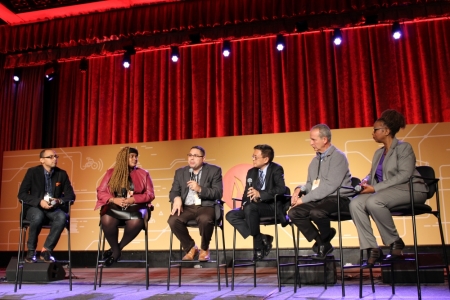Why Racial Reconciliation Is More Than Holding Hands and Singing Kumbaya

NEW YORK — When Pete Scazzero founded New Life Fellowship Church in Queens, New York, in 1987 he envisioned a church that would bridge a community across racial, cultural and economic lines.
With members from more than 70 nations eventually filling his pews, Scazzero, who is white, soon realized his vision was in trouble.
"We found ourselves with a church with 70-plus nations with a good 20 to 25 percent African-American with all the racial tension there as well as all the different countries of Latin America with all the racial issues. ... We have a good portion of Asians with Indonesians, Filipinos, Chinese, Koreans and then whites and Eastern Europeans. It was a mess," said Scazzero.
The audience listening to Scazzero, who was a part of a panel discussion on racial reconciliation at the Movement Day 2015 conference hosted by the New York City Leadership Center last Thursday, erupted in laughter.
"I realized something was deeply wrong by year five or six because we were just gonna be another blow-up. Because evangelicalism, at least as I was trained in seminary, it wasn't deep enough to transform people, [not] deep enough for this," Scazzero continued, as he spoke about his vision.
Scazzero had managed to bring a diverse pool of people under one roof to praise God but he saw that his congregation wasn't a reconciled community.
To solve the problem, Scazzero and his church embarked on a process to build what he calls emotional spirituality to help people get connected at a deeper level.
"It led us to a crisis to realize people aren't changing enough to do this. It's all theory here, it's gonna blow. And so it led us into a journey of [what we call] emotional spirituality," said Scazzero.
His website describes emotional spirituality as "a deep beneath the surface spirituality that transforms people who transform the world."
"And we (pointing to Rich Villodas, lead pastor of New Life Fellowship Church who was moderating the panel discussion,) don't have to say it, New Life, we both know how deeply the Gospel transforms you in response to this question — who can your son or daughter not marry?" he said.
Scazzero's experience reflected one voice in a conversation on racial reconciliation Thursday that showed how complex and difficult the path toward a vision of racial harmony is.





















